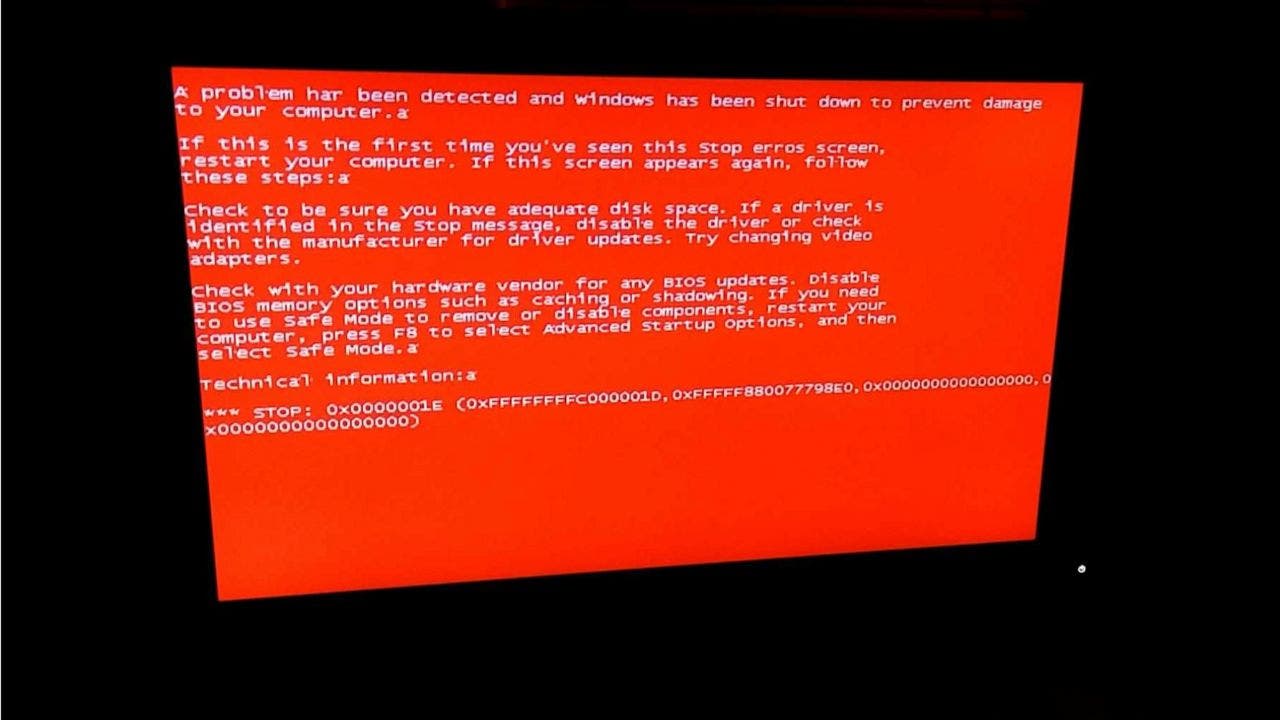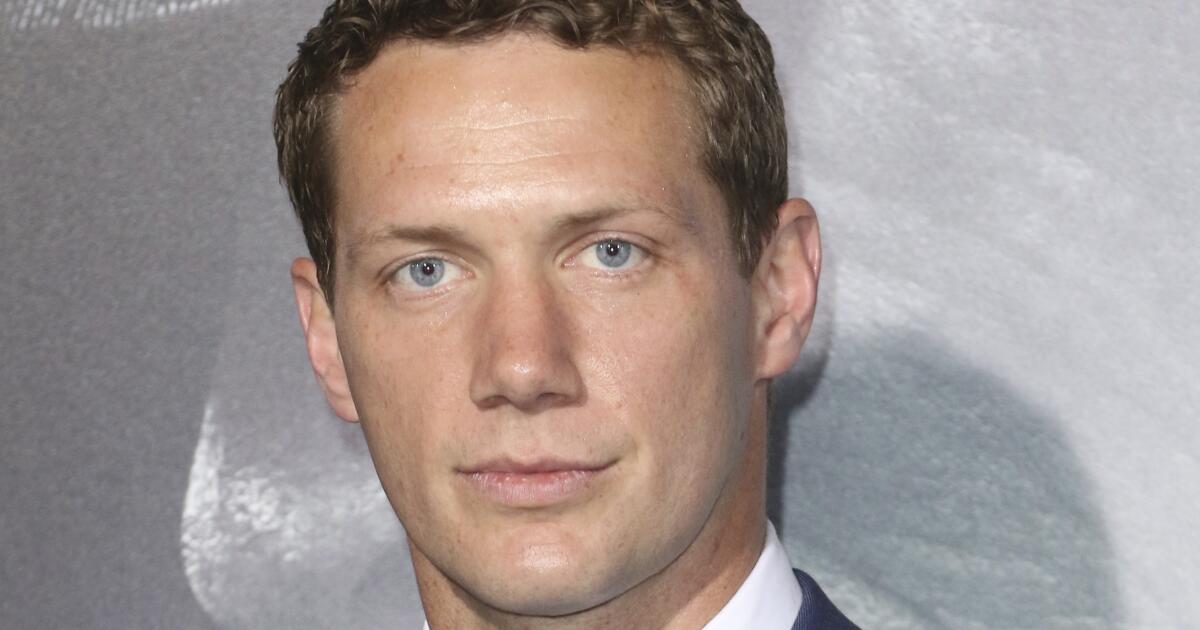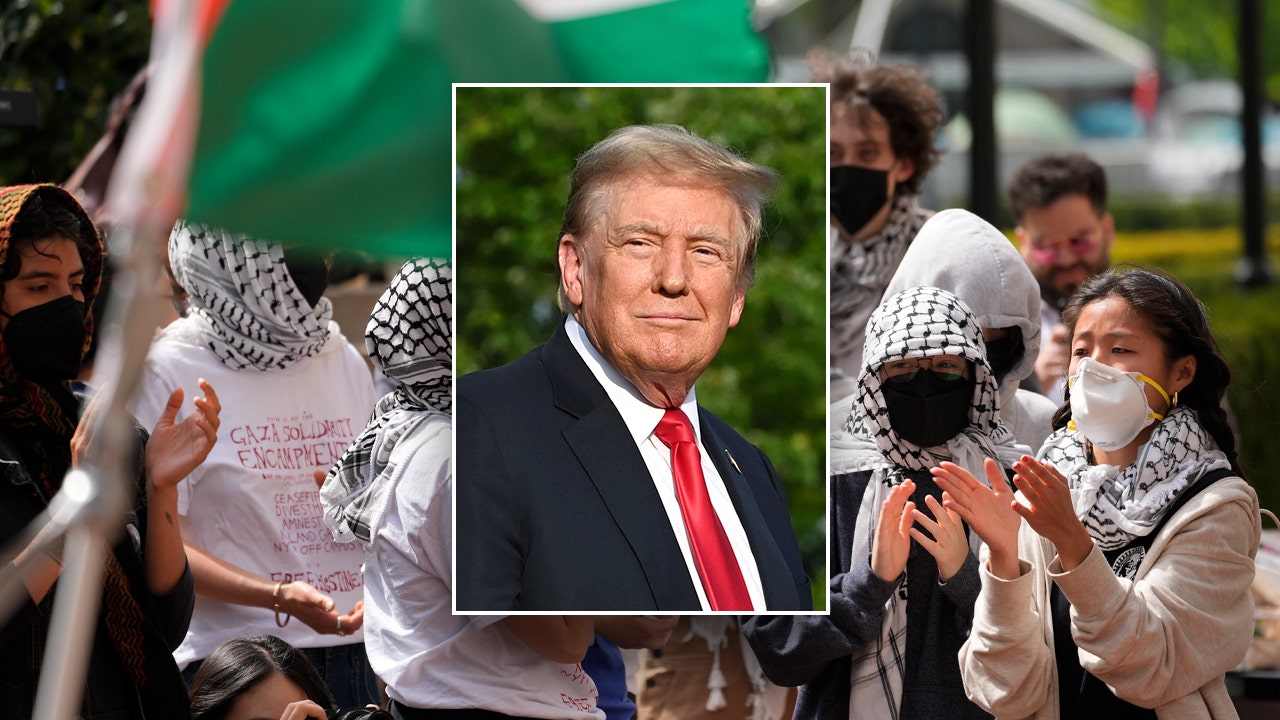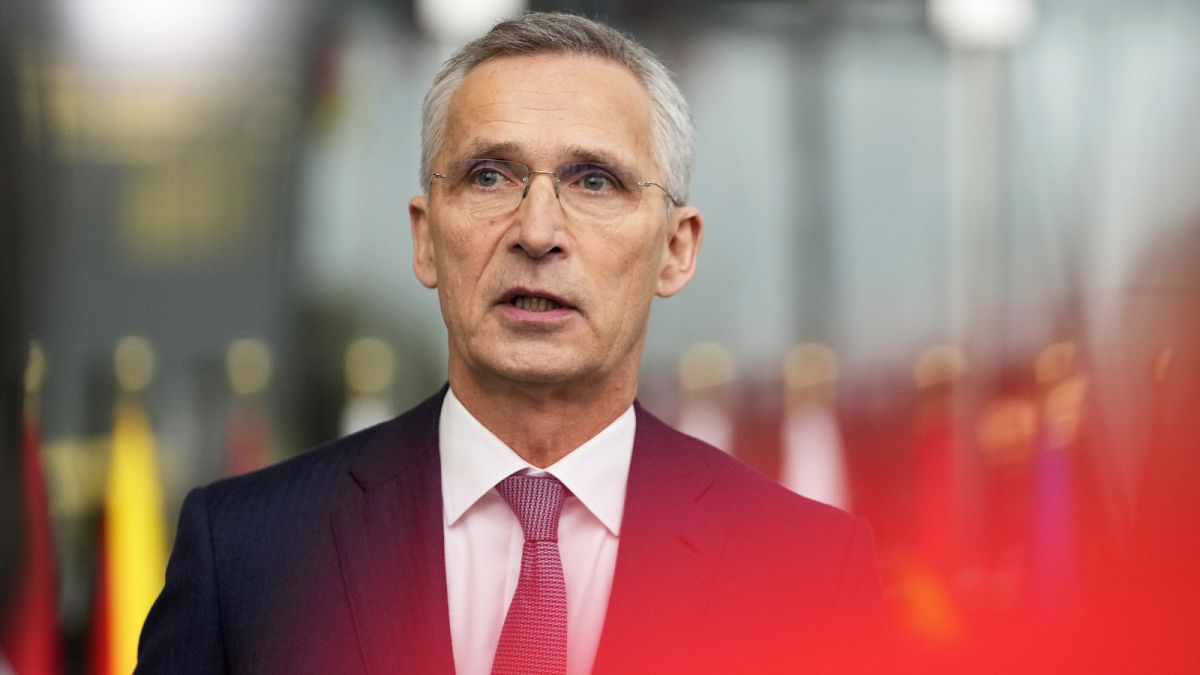World
Photos: Pakistan’s Imran Khan arrested after court convicts him

Former Pakistani Prime Minister Imran Khan was arrested at his home in Lahore on Saturday after a court found him guilty of corruption and sentenced him to three years in jail.
The former international cricket star had long warned he would be arrested to prevent him from participating in elections due to be held before the end of the year.
Anyone convicted of a criminal offence is usually disqualified from contesting elections or holding office in Pakistan.
Khan, 70, has faced a slew of court cases for charges he has said are politically motivated since being removed from power in a vote of no confidence last year, and he was not present when he was sentenced on Saturday.
In May, he was arrested and briefly detained in Islamabad for the same case, sparking deadly unrest during which supporters of his Pakistan Tehreek-e-Insaf (PTI) party poured onto the streets and clashed with police.
In the aftermath of his release following three days in custody, PTI was targeted by a crackdown with thousands of arrests, reports of intimidation and muzzling of the media.
Images of Khan, or even mentions of him by name, are prohibited from being broadcast on TV channels, but he remains wildly popular, and last month a debut video to his personal TikTok account racked up more than 135 million views and 4.5 million likes within 36 hours.
After he was taken away by police on Saturday, a video statement Khan made before his arrest was posted to his X, formerly Twitter, account, with him calling for his supporters to protest.
“My fellow Pakistanis, they will have arrested me and I’ll be in jail by the time this message reaches you. I have just one request and appeal, that you are not to sit silently at home,” he said.
“This is a war for justice, for your rights, for your freedom … chains don’t just fall off, they have to be broken. You must continue peaceful protest until you get your rights.”
Khan’s jailing will do little to calm the economic and political unrest that has roiled the nation for the past 18 months.

World
What happened when Israel attacked Rafah?

Thirteen out of 21 people killed by Israel in an air strike on the so-called “safe area” of al-Mawasi were civilian women and girls, Al Jazeera’s Hind Khoudary reported on Tuesday.
This was the second attack since Sunday, with a horrifying strike on Sunday night setting displaced people’s shelters ablaze not too far from Tuesday’s strike.
The world had watched, aghast, on Monday as displaced Palestinians were forced to dig through smouldering remains with their bare hands – looking for bodies, or injured people, or in some cases, a few scraps of food they could salvage to keep their families going a bit longer.
As reports further clarify what happened on Tuesday, here are the details of Sunday’s attack:
When and where was this attack?
The attack happened at night on May 26.
It was inflicted on an encampment of makeshift shelters just north of Rafah city, in an area called Tal as-Sultan
It came after United States President Joe Biden said a “major offensive” by Israel on Rafah would be a red line.
What happened in the attack?
Many shelters burst into flames with their occupants still inside.
The Gaza Government Media Office said Israel dropped seven 900kg (2,000-pound) bombs as well as missiles on the displacement camp.
The Israeli army said it targeted Rafah with “precision munitions”, and that a nearby fuel tank led to the subsequent fire.
Horrific videos emerged of the aftermath – the most notable was of a man holding up the corpse of a young child without a head.
Al Jazeera’s Sanad Verification Agency was able to obtain images of fragments believed to be of the weaponry used in this attack. The photos the agency obtained show the tail of a GBU-39/B small-diameter bomb, which is made by Boeing. The GBU-39/B includes a jet engine taken from the M26 unguided missile.
Who were the people killed?
Thousands of civilians had been sheltering in the Tal as-Sultan area, seeking some minimal protection from the continuous Israeli attacks across Gaza.
The Israeli government had not issued any orders to evacuate the area before it attacked.

How many people died?
Israel killed at least 45 people in the offensive.
The total number of injured people is hard to determine, as the hospital where casualties were taken has closed after a subsequent Israeli drone attack on its entrance that killed two members of staff.
How did they die?
Some people died from the impact of the bomb.
Some people “reportedly burned to death”, according to Philippe Lazzarini, commissioner-general of the United Nations Relief and Works Agency for Palestine Refugees (UNRWA).

What were they doing when they died?
Accounts from Rafah say that many of the dead were preparing to go to sleep when the attack occurred.
Why is Israel doing this?
Initially, the Israeli army claimed it had struck “a Hamas compound in Rafah in which significant Hamas terrorists were operating”.
It added it was “aware of reports indicating that as a result of the strike and fire that was ignited several civilians in the area were harmed”.
Israeli Prime Minister Benjamin Netanyahu has since said the attack was “a tragic mistake.”
“Despite our best effort not to harm those not involved, unfortunately a tragic error happened last night. We are investigating the case,” Netanyahu said.
The attack came two days after the ICJ ordered Israel to halt its offensive on Rafah.

The United Nations Security Council (UNSC) is set to convene an emergency meeting over the attack on Rafah.
To date, the United States has vetoed every UNSC proposal aimed at holding Israel accountable.
World
Why the Biggest Tech Companies Are Suddenly Streaming Sports

When it comes to streaming, sports had to play catchup. In the mid-2010s, as the world grew comfortable with digital entertainment services, major leagues largely remained on the sidelines. Companies like Netflix focused on binge-able shows over live entertainment and streamers balked at the regional restrictions or high costs that came with acquiring athletic events. Leagues, meanwhile, valued the consistent reach traditional TV provided—and the big paychecks, too.
“I’m very confident we can get twice as big as we are without sports,” Netflix CEO Ted Sarandos said at the end of 2022. Well, this month Netflix announced a deal to stream two NFL games on Christmas Day next season, at a reported total cost of roughly $150 million. For those counting at home, the company’s market cap and subscriber count are each up more like 10% rather than 100% since Sarandos’ prediction.
And it’s not just Netflix getting involved. Apple committed to a 10-year partnership with Major League Soccer. Google is now spending $2 billion annually for NFL Sunday Ticket rights. Amazon seems, dare I say, primed to add NBA inventory to its NFL slate and other sports rights. Even Roku recently joined the party. If Microsoft launched a Windows streaming service anchored by live sports, we’d have no right to be surprised.
So what happened? It’s a question I’ve been asking in various forms to both sports and tech decision-makers for the last several years. As expected, there’s no single explanation for big tech’s big surge into the sports viewing experience. But the following four reasons are all regularly citied.
The tech works
This was always going to be the first hurdle. And live sports went through its growing pains, with broken payment processes holding viewers up as well as glitches emerging during crunch time of the Super Bowl. Netflix’s early live streaming attempts came with their own set of issues.
In 2024 though, the tech’s solid. Sure, there are areas for improvement, such as cutting down the delay between reality and the broadcast (latency) or upping the picture quality. Accessibility is also an issue for those without reliable, high-speed internet. But in each case, we’ve passed the point of “good enough.”
Sports are multi-generational
For a time, streamers specialized: There was your horror movie service, your classics subscription, your kids-focused offering and so on. But now, the heavy hitters try to appeal to a wide swath of potential viewers, and sports hit multiple demographic segments like few other properties. That’s especially true as blockbuster movies have become much less of a sure thing. The $75 million price tag Netflix is paying per NFL game is roughly equivalent to the cost of a single midsized movie on the service. Christmas flick out, Patrick Mahomes in.
By the same token, sports fans are generally followers for life. While people often cycle through their preferred type of TV show, athletic allegiances stick around. As streamers put an emphasis on retaining their current customers, that type of loyalty is invaluable.
Sports = ads
Today’s consumer has gotten used to ad-free, or at the very least ad-light, entertainment experiences. That is, except for sports fans. While the NFL has worked to lighten ad loads during games, commercials are still a natural part of broadcasts. Sports also offer advertisers a reliable audience watching brand-safe content, regardless of what platform games air on. And tech companies are increasingly in the ad business.
Amazon turned its Black Friday NFL game into an ad tech showcase. Netflix’s push into live entertainment has uncoincidentally followed the addition of an ad-supported pricing tier. Even Apple is reportedly attempting to grow its ad business, backed in part by sports assets.
At Netflix’s pitch to advertisers in NYC earlier this month, sports partners like Formula 1 and WWE received the largest footprint in the company’s warehouse-turned-“immersive experience.” That wasn’t a coincidence.
Eyes around the world
For a while, sports leagues selling games to streamers was seen as taking extra money at the expense of reaching fewer fans. But now, global tech brands can offer something that some traditional providers can’t match.
Amazon has helped the NFL reach new, younger fans with its shows, while Netflix will now make football easier to watch for many international fans. “It’s a global opportunity for us,” NFL media COO Hans Schroeder recently explained. I expect that the game times—1 and 4:30 pm ET rather than primetime—were in part set to increase viewership in Europe and beyond.
Tech companies have also wooed leagues with the precise data they’re able to gather on viewers and potential viewers, valuable information for sports executives building out international marketing strategies.
Put it all together and it becomes clear why major tech companies are coming to compete with sports’ traditional broadcasters. The only question left is how much more they’ll take.
World
Top South African rabbi critical of govt's 'support' of Hamas, says US needs to stop 'bad actors' on continent
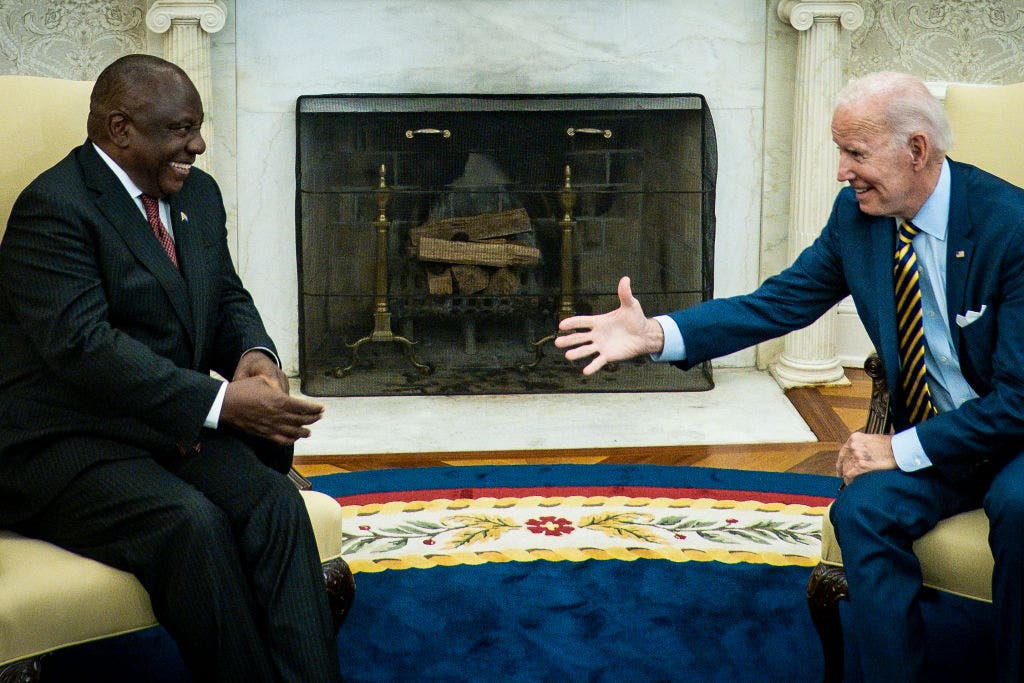
FIRST ON FOX – Iran, Russia and China are sweeping across Africa, with the U.S. facing a crisis of influence. In South Africa, the government has aligned itself with the “bad actors” Russia, China and Iran. These are the main takeaways from an exclusive interview with South Africa’s chief rabbi, Dr. Warren Goldstein.
Goldstein spoke with Fox News Digital in Johannesburg on Monday, on the eve of what promises to be a watershed presidential election in South Africa this week. Thirty years ago, the African National Congress (ANC) Party swept into power, carrying Nelson Mandela to become the country’s first democratic president. There have been remarkable achievements, but corruption, nepotism, failed government promises and catastrophic fraud-linked power blackouts have left democracy critically strained and many voters disillusioned. In Wednesday’s polls, for the first time, the ANC is likely to lose its majority.
Across Africa, as democracies become weaker, countries which are strange bedfellows step out of the murky shadows. “The bad actors in international politics, China, Russia and Iran, are making a grab for the African continent,” Goldstein told Fox News Digital.
Goldstein added “also realize that the African continent is suffering from a wave of jihadi terror in which Christians are being persecuted across the continent. In this context, South Africa in particular, and the African continent in general, is a beacon and can be a very important ally for the United States in promoting freedom and democracy.”
GOP SENATORS BLAST BIDEN ADMIN MOVES IN AFRICA AS RUSSIA LOOKS TO FILL VACUUM
South Africa’s chief rabbi, Dr. Warren Goldstein. (Office of the Chief Rabbi )
“American values are at stake on the African continent, and we need a much stronger American presence in the continent as a whole and in South Africa in particular”, he continued.
Responding to the growing worry of U.S. foes gaining ground in South Africa and the region, a State Department spokesperson told Fox News Digital “we have a strong relationship with South Africa and that relationship is based on the priorities of the American people and the South African people, our shared values and our interests. We are committed to an affirmative agenda with South Africa, through which we work together to bring our nations’ respective priorities to the table.”
The spokesperson added “The United States believes all countries may choose the countries and groupings with which they associate. South Africa is a sovereign country that can make its own decisions about how to engage others. The relationship between the United States and South Africa is broad, deep, and multifaceted, grounded in values, interests, and people-to-people ties that include our common journeys to uphold human dignity. We’re focused on making our relationship even stronger, to the benefit of Americans and South Africans, and we aren’t distracted by what others are doing.”
Analysts have often accused the ANC of telling the South African government, in which, until Wednesday, its members have a majority, what to do and say. This, Goldstein told Fox News Digital, has led to the country turning away from the West. “A very important thing to understand is the distinction between the ANC government and the South African people. They are very divergent in their values,” said Goldstein.
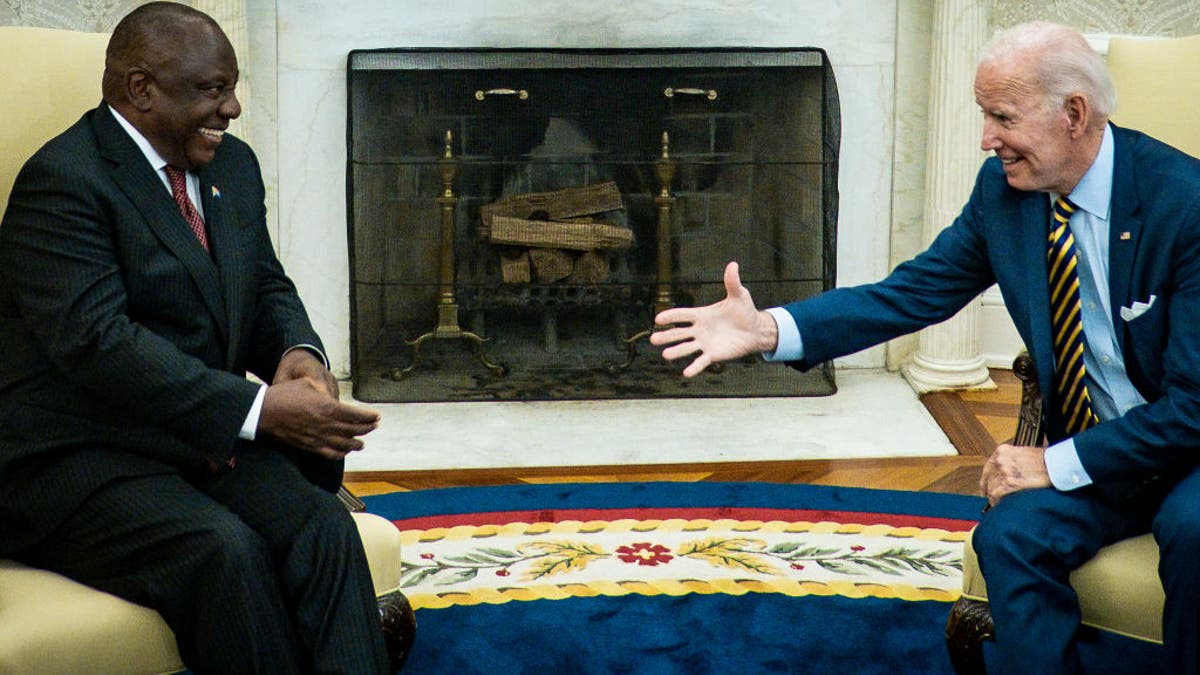
President Biden, right, shakes hands with South African President Cyril Ramaphosa during a bilateral meeting in the Oval Office of the White House on Sept. 16, 2022 in Washington, D.C. The two leaders reaffirmed the importance of enduring partnership, and discussed their work together to address regional and global challenges. (Photo by Pete Marovich-Pool/Getty Images)
“The ANC government has aligned itself with Russia, China and Iran. The South African people do not share their values in this regard. And to note that this is going to be the first time in South African history the ANC is going to drop below 50% (in electoral votes).”
“It has lost the support of the majority of South Africans. And therefore, when America is considering the opportunities for alliances with South Africa, with the continent, it needs to look beyond the ANC government. That it is a waning force in South African politics, and it is eventually on its way out”
CHRISTIANS IN AFRICA FACE WORRYING RISE IN KILLINGS, PERSECUTION AND DISPLACEMENT
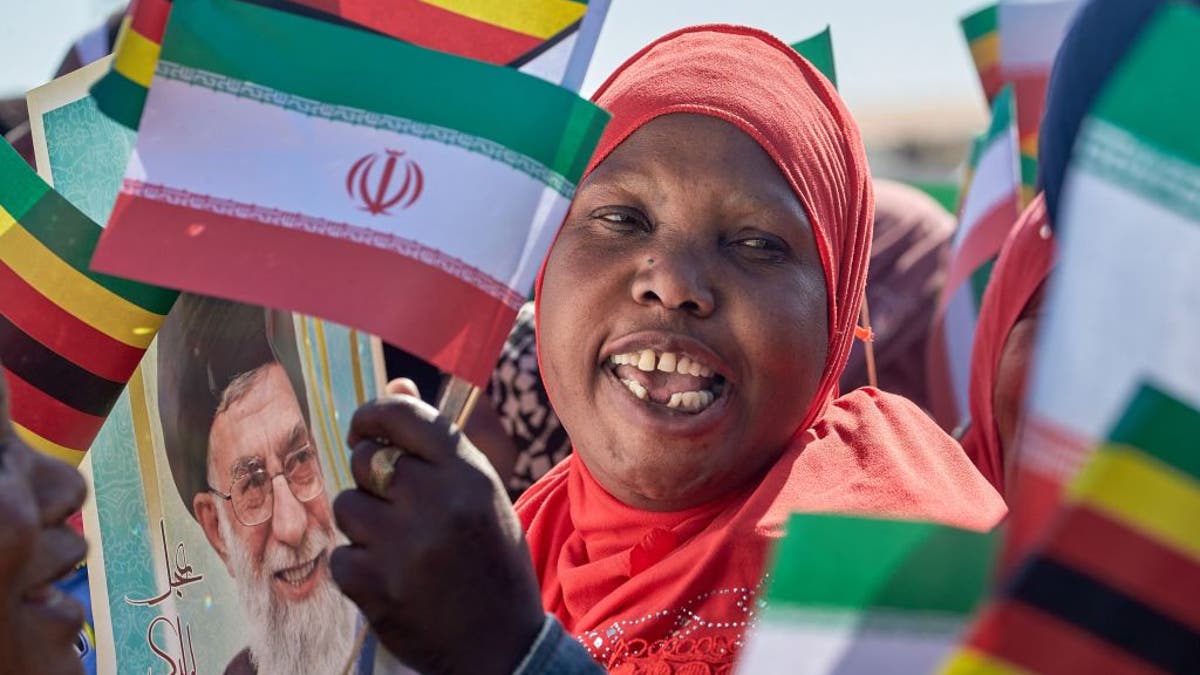
A woman holds up a poster of Iranian President Ebrahim Raisi (not seen) as they welcome him upon arrival for a state visit at the Robert Gabriel Mugabe International Airport in Harare on July 13, 2023. (Jekesai Nijikizana/AFP via Getty Images)
The South African government responded to Goldstein’s criticism, noting, “Firstly, it’s wrong to label the South African government with a political party,” Clayson Monyela, head of public diplomacy at South Africa’s Department of International Relations, told Fox News Digital.
“Decisions of the state are taken by the state and not the ruling party,” Monyela added. “The values that this government espouses are shared by the people it represents. The constitution of the Republic is the guide.”
However, the official opposition, the Democratic Alliance (DA), believes the ANC pushes its cadres into influential government positions. On their own website, the ANC calls the positioning of their faithful ‘cadre deployment,” as if such a procedure was part of a military exercise.
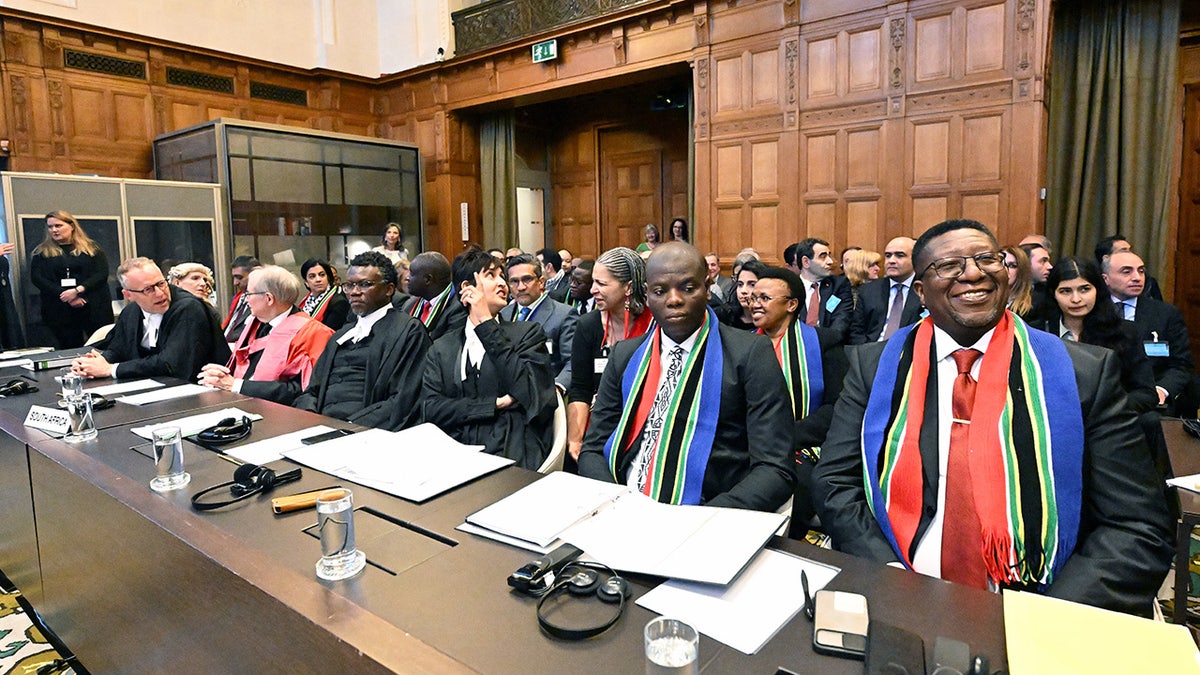
Public hearings in South Africa’s genocide case against Israel begin at the International Court of Justice in The Hague, Netherlands, on Jan. 11, 2024. (Dursun Aydemir/Anadolu via Getty Images)
In a document accompanying a court action in February, the DA stated “The ANC controls both the demand-side and the supply-side of senior administrative roles, State-owned enterprises (SOEs), boards, entities, and independent state institutions.”
This past Friday, the International Court of Justice (ICJ), the world’s top court, voted that Israel should “immediately halt its military offensive in Rafah.” South Africa had applied to the court to stop the attack in Gaza.
Rabbi Goldstein said, “The ICJ ruling is not only an attack on Israel’s right to self-defense, it is also a threat to the United States of America and all countries of the free world. – when you can have, for example, a judge from Lebanon presiding over this matter, and countries representing, if you think about the United Nations, the vast majority of the members of United Nations do not come from free democracies. You cannot have dictatorships and their representatives determining when free democracies can defend themselves against the forces of terrorism and violence in the world.”
ANGER RISES OVER SOUTH AFRICA MAKING MILLIONS IN US BENEFITS WHILE COZYING UP TO IRAN, RUSSIA AND HAMAS
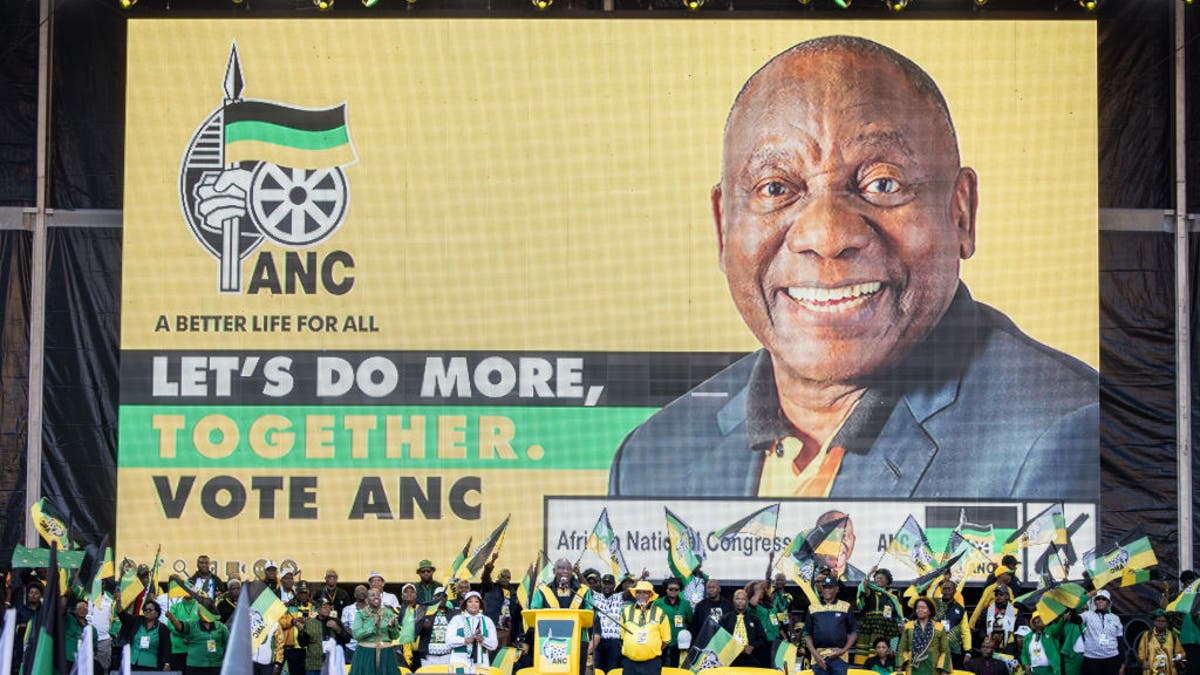
President of the ruling African National Congress (ANC) and South African President Cyril Ramaphosa speaks to supporters during the ANC Siyanqoba Rally held at FNB Stadium on May 25, 2024 in Johannesburg. South Africa’s national and provincial elections will be held on May 29, 2024 to elect a new National Assembly and provincial legislature in each of the nine provinces. (Photo by Chris McGrath/Getty Images)
Monyela defended the country’s actions, saying “The SA government’s principled position on the Palestine/Israeli matter has been vindicated repeatedly by the rulings of the ICJ. We approached the ICJ to stop the current genocidal acts being perpetrated by Israel against the people of Palestine. This is what all peace-loving people of the world, who believe in human rights and international law, should do.”
South Africa kicked out Israel’s ambassador and closed the embassy, but Goldstein told Fox News Digital that there is little antisemitism among ordinary South Africans. “Antisemitism in South Africa today is a fascinating paradox, which is very revealing about what is actually happening in this country. On the one hand, you have the South African government that has been the most anti-Israel, pro-Hamas, pro-Iranian government in the world when considering free democracies, which is a betrayal of the South African constitution and the values of this country.”
US CONCERNED OVER SOUTH AFRICA’S GROWING TIES WITH RUSSIA, IRAN AND HAMAS: ‘FALLEN’ FOR PROPAGANDA

Members of the Active African Christians United Movement pose as one of them blows through a shofar as others gather in support of Israel outside the embassy of Israel in Pretoria on Nov. 17, 2023. (Photo by EMMANUEL CROSET/AFP via Getty Images)
Goldstein continued” On the other hand, the South African Jewish community has experienced amongst the lowest levels of antisemitism of any Jewish community in the world. And so you have this paradox, an assault, an ANC government that has been pro-Iran, and a South African people that is welcoming of its fellow citizens of the Jewish faith together with all of the citizens of this country, this tremendous spirit of togetherness of unity and diversity, which is the motto of the country, really drawing from the spirit of Nelson Mandela, which is still felt to this day, which is utterly at odds with the spirit and the values of the ANC government.”
Monyela hit back, adding, “The challenge with this comment is the deliberate blurring of the lines between the ANC and the state. The South African Government is not anti-Israel and most certainly not pro-Hamas.”
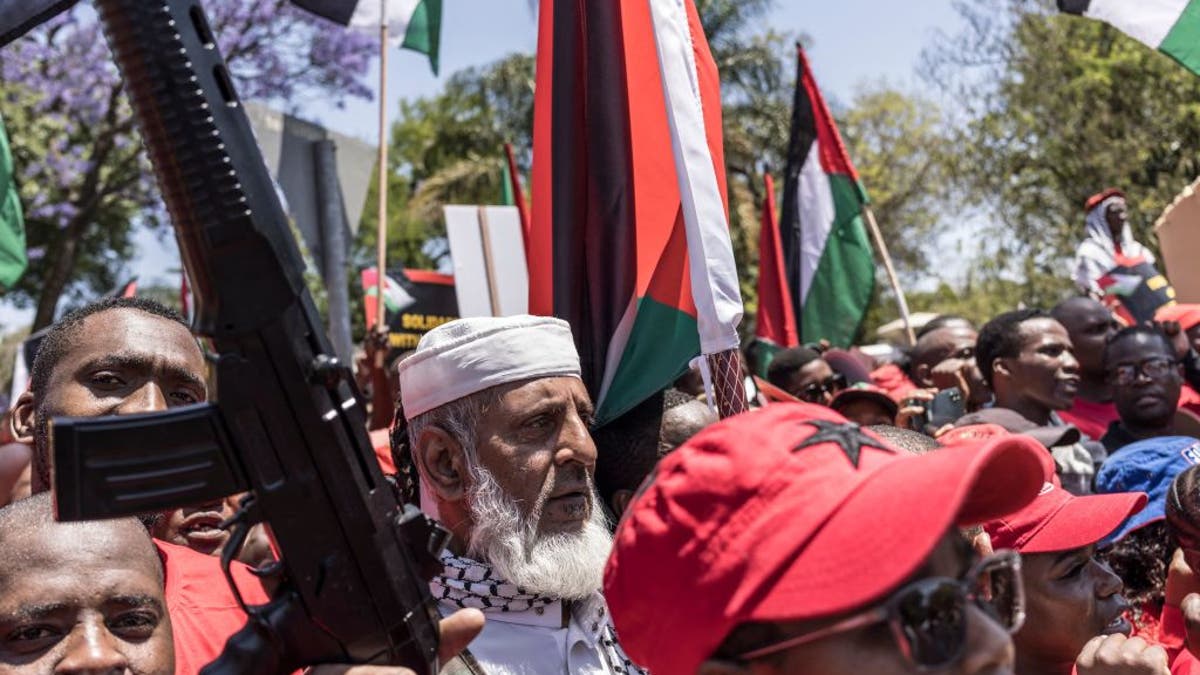
A man brandishes a replica toy gun during a pro-Palestinian demonstration organized by the South African opposition party Economic Freedom Fighters in front of the Israeli Embassy in Pretoria on Oct. 23, 2023. (Marco Longari/AFP via Getty Images)
“It is the most ridiculous and outrageous thing to suggest”, added Monyela. “These false and manufactured narratives, including the baseless antisemitism label, are a blunt object meant to silence us from speaking out against the genocidal acts of Israel against the Palestinian people.” He claimed that “The ICJ has repeatedly agreed with us. Look at the comments of the President of France on the latest attacks in Rafah that killed innocent civilians. Even the White House has criticized Israel. The Israeli Prime Minister himself has called for an investigation. South Africa is consistent in calling for the respect of human rights and international law. Our position on the two-state solution is on record.”
Fox News Digital reached out to the ANC for comment, but received no response.
-

 Movie Reviews1 week ago
Movie Reviews1 week ago‘The Substance’ Review: An Excellent Demi Moore Helps Sustain Coralie Fargeat’s Stylish but Redundant Body Horror
-

 Movie Reviews1 week ago
Movie Reviews1 week ago‘Rumours’ Review: Cate Blanchett and Alicia Vikander Play Clueless World Leaders in Guy Maddin’s Very Funny, Truly Silly Dark Comedy
-

 Movie Reviews1 week ago
Movie Reviews1 week ago‘Blue Sun Palace’ Review: An Intimate, Affecting and Dogma-Free Portrait of Chinese Immigrants in Working-Class New York
-

 News1 week ago
News1 week agoVideo: A Student Protester Facing Disciplinary Action Has ‘No Regrets’
-

 Culture1 week ago
Culture1 week agoFrom Dairy Daddies to Trash Pandas: How branding creates fans for lower-league baseball teams
-

 World1 week ago
World1 week agoPanic in Bishkek: Why were Pakistani students attacked in Kyrgyzstan?
-

 Politics1 week ago
Politics1 week agoAnti-Israel agitators interrupt Blinken Senate testimony, hauled out by Capitol police
-

 Politics6 days ago
Politics6 days agoMichael Cohen swore he had nothing derogatory on Trump, his ex-lawyer says – another lie – as testimony ends





